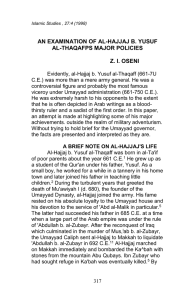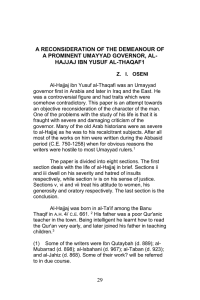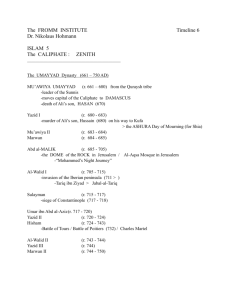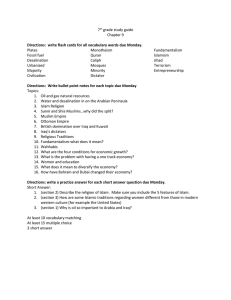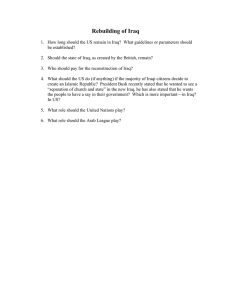O rider who drives his mount, setting out
advertisement
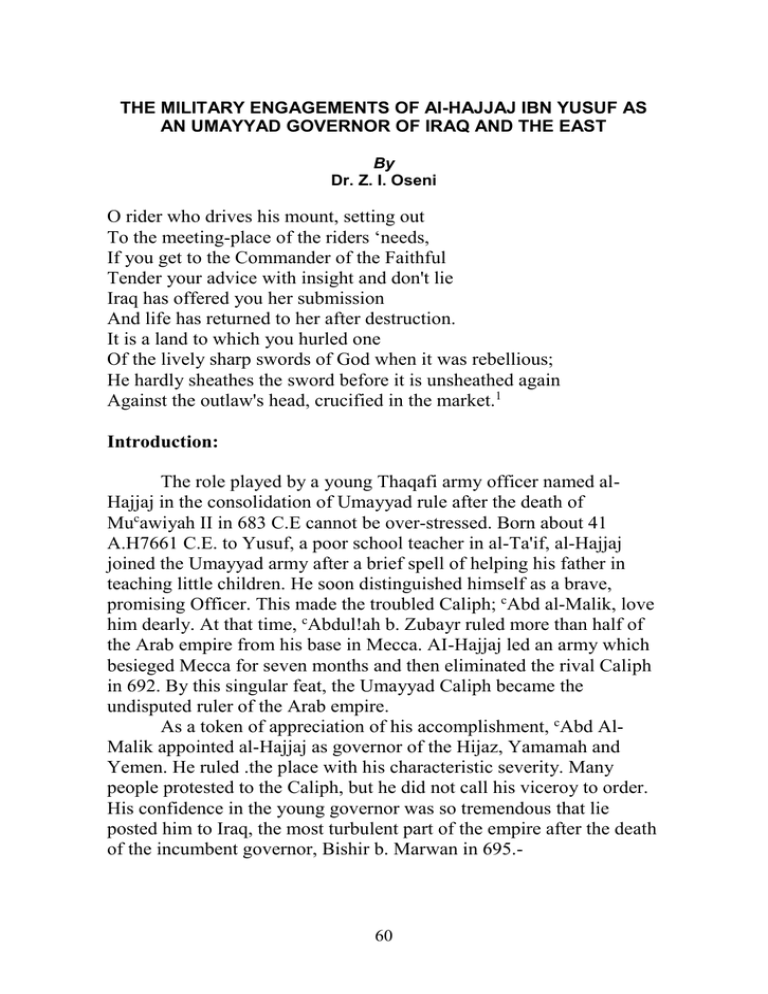
THE MILITARY ENGAGEMENTS OF AI-HAJJAJ IBN YUSUF AS AN UMAYYAD GOVERNOR OF IRAQ AND THE EAST By Dr. Z. I. Oseni O rider who drives his mount, setting out To the meeting-place of the riders ‘needs, If you get to the Commander of the Faithful Tender your advice with insight and don't lie Iraq has offered you her submission And life has returned to her after destruction. It is a land to which you hurled one Of the lively sharp swords of God when it was rebellious; He hardly sheathes the sword before it is unsheathed again Against the outlaw's head, crucified in the market.1 Introduction: The role played by a young Thaqafi army officer named alHajjaj in the consolidation of Umayyad rule after the death of Mucawiyah II in 683 C.E cannot be over-stressed. Born about 41 A.H7661 C.E. to Yusuf, a poor school teacher in al-Ta'if, al-Hajjaj joined the Umayyad army after a brief spell of helping his father in teaching little children. He soon distinguished himself as a brave, promising Officer. This made the troubled Caliph; cAbd al-Malik, love him dearly. At that time, cAbdul!ah b. Zubayr ruled more than half of the Arab empire from his base in Mecca. AI-Hajjaj led an army which besieged Mecca for seven months and then eliminated the rival Caliph in 692. By this singular feat, the Umayyad Caliph became the undisputed ruler of the Arab empire. As a token of appreciation of his accomplishment, cAbd AlMalik appointed al-Hajjaj as governor of the Hijaz, Yamamah and Yemen. He ruled .the place with his characteristic severity. Many people protested to the Caliph, but he did not call his viceroy to order. His confidence in the young governor was so tremendous that lie posted him to Iraq, the most turbulent part of the empire after the death of the incumbent governor, Bishir b. Marwan in 695.- 60 This study is centred on the military activities of al-Hajjaj in Iraq, his new duty post These activities include his dramatic arrival at Kufah and how he struck fear in the minds of the people. The people's reaction was a series of revolts the most serious of which was that of Ibn al-Ashc ath, a subordinate prefect under him. This major revolt was a clear indication of internal cleavages within the Umayyad army, a manifestation of what people felt about the high-handedness, impatience and arrogance of the Umayyad viceroy. Also discussed briefly is the expansion of al-Hajjaj's domain by conquest which was carried out after the end of internal revolts in Iraq. The principal actors in his feat were Qutaybah b.. Muslim and Muhammad b. al-Qasim. Again, internal crises within the Umayyad formation halted the two men's march eastwards shortly after alHajjaj's death in 714. The conclusion contains remarks about the illwind which a climate of terror, high-handedness, rebellion, rancour and bellicosity typifies. There is ample evidence that in al-Hajjaj's reign in Iraq here were positive developments and progress. These did materialize fully only after the end of the state of internal strife following his costly victory over his opponents, With this humble attempt at focusing a searchlight on an aspect of al-Hajjaj's life, it is hoped that students of Islamic history would find some explanation, however, pathetic or little, for some of the events of that part of Umayyad rule which throve mainly on old Arab, pride based on ancestral glory, vanity and pretensions which are opposed by the pristine message of Islam. It is our belief also that Arabic literary critics would find this brief study useful in the understanding of the political poetry of the era. Al-Hajjaj's Arrival in Iraq: The Caliph cAbd al-Malik summoned al-Hajjaj in 695 and sent him to Iraq as his viceroy there to. succeed Bishr b. Manvaa, the Caliph's deceased brother. The problem of the militant Kharijites was till seething. Bisu had sent a number of commanders to fight them but without success; the last one he sent1 was al-Muhallah b Abi Surrah whose army was garrisoned at Ram Hurmuz on the bank of the Tigris River.3 Many of the Iraqi forces under his command were not disciplined. A great number of them who were supposed to be Sighting under him were idle with their families in the big cities of Iraq such as 61 Basrah and Kufah. The end result was that Umayyad grip on the territory became shaky. This was the situation which, al-Hajjaj was given -a certificate of authority to go and rule Iraq. At that time the 33 year-old hero was warming up to perform the assignment to the Caliph's satisfaction as he had done in Arabia. He rode a fast camel bare-back and, in the company of twelve of his men, entered Kufah incognito.. He had ordered his troops to follow him. At Kufah, he asked people to go to the mosque where he was to address them, It was there that a man named Muhammad b..cUrnayr almost stoned him for keeping the people in suspense for too long. The new governor addressed the congregation in .an arrogant manner. Part of the speech is as follows: By God, I will cause evil-to be borne by its weight, cover its feet with its shoes and reward it in kind. I can see heads that. are ripe and it is time to cut them, and I am the one to do it. I can see blood sparkling between the turbans and beards... ... By God, o people of Iraq, the fountain of schism and hypocrisy and . the Vilest of behaviour! My sides cannot be probed (with fingers) like' . the probing of a fig tree, and I cannot be stampeded into action with the clanging of water-skins. I have been examined in intelligence and experience and have been subjected to the severest of measures of inspection. The commander of the Faithful emptied his quiver before himself and then tested the arrows and found me to be the most bitter of the sticks and the most difficult to break, he Inert Directed me against you and hurled me at you. For long you have participated 62 actively in riots. You followed the path of error. 3y God, I will trim you like a stick, strike you (against each other) like pebbles, shake you up like a thorny tree, and beat you like wild camels. You are like the people of a town "which was faithful and tranquil, having its sustenance comfortably from all places. It then became ungrateful for God's favours and He made them taste the affliction of famine and fear on account of what they had done..." By God, you have to walk straight on the path of the truth or I will put a mark on every man's body among you. Any of the soldiers of al-Muhallab I see among you after three days, I will shed his blood, subject his wealth to pillage and demolish his house.4 After the horrible speech, al-Hajjaj asked his secretary to read a letter from the caliph. The man obeyed and began to read The letter started with the mention of God's name, and the Caliph's greetings to the faithful Muslims of Iraq.5 The Iraqi audience was silent when the letter was being read. But the new governor was furious at their not responding to the Caliph's greeting of friendliness. He shouted angrily: stop there, .boy! You people of Iraq, rebels, traitors and vicious hearts! You men of schism and sin! Shall the -Commander of the Faithful greet you with peace and you greet him not with peace also? If God leaves me among you, I swear, I will split and trim you like fire-wood, I will teach you’ manners in a new school. Read the letter, boy!6 The secretary started again from the beginning of the letter and when he' got to the greeting from the Caliph, the crowd in the mosque responded clamorously, perhaps more out of fear. Thus the letter was read. Thereafter the governor stepped down from the pulpit and ordered the distribution of pay to al-Muhallab's soldiers. On the third 63 day, he was reviewing the soldiers before their march to join al~MuhalIab's forces when an old man named cUmayr b. Dahi' alBurjumi al-Tamimi came forward to plead for exemption. He begged that his young son be taken in his place. The viceroy's heart was touched and he allowed the man to go As cUmayr was going away, one of al-Hajjaj's aides told him that the old man should not be allowed to go because he was anti-Umayyad to the core. GUmayr was the one who, as a young man in 656 C E., sprang on the corpse of the Caliph c Uthman b. cAffan and broke two of his ribs in Medina. The governor's temper rose immediately this information was given to him. He called c Umayr back and inquired from him whether the allegation was true. He confirmed it but with an explanation that cUthman imprisoned his father and left him to die in prison. The viceroy made up his mind to execute him but decided to link his death with the order he had given to soldiers not to loaf around after the three days of grace he granted them. He ordered that cUm;iyr's neck be slit, and his boys complied instantly. The mere fact that the governor killed the old man served as a deterrent to others. Soldiers rushed in thousands to swell up the army of al-'Muhallab.7 This pleased the latter greatly, and he was able to deal deadly blows to the Kharijites. Revolts Against al-Hajjaj: The Iraqis and other Umayyad subjects in the Eastern provinces did not allow al-Hajjaj to boast and rule Them with an iron hand unchallenged Considering the political and military climate in that region, it would have been abnormal to expect the subjects to bow submissively. One of the first problems al-Hajjaj had to face in Iraq was^ revolt led by Ibn al-Jarud as a result of the reduction in the clraqi soldiers' salary by the Caliph. This reduction was realized by the people-when the governor v/as distributing their pay to them shortly before their march to join al-Muhallab's forces. Al-Hajjaj faced the challenges squarely and ruthlessly suppressed the revolt.8 . The governor mobilized troops in Iraq to fight the most stubborn Kharijite group, the Azraqites, who had chosen Qatari b. al-Fuji'ah as their leader (Imam). The group was then in control of Kirman, Paris and other Eastern districts9. With more troops and higher morale, alMuhallab inflicted a crushing defeat on the Azraqites in 77 A.H./69610 C.E.. As this was going on, another formidable group of Kharijites 64 under the command of Shabib B. Yazid, was threatening Iraq itself from their base in Mosul. The governor was compelled to ask the Caliph for men and arms. With the help of the reinforcements from Damascus, the Umayyad capital, al-Hajjaj vanquished the Kharijites at'Dujail in Khuzistan in the spring of 697.H Meanwhile, an Umayyad governor of Mada'in, alJMutarrif b. al-Mughirah b. Shucbah, revolted against al-Hajjaj and allied himself with the Kharijites. The viceroy wasted no time in crushing them.12 With the decimation of the Kharijites, al-Hajjaj now had to govern Khuzistan and Sijistan in addition to Iraq. He appointed alMuhallab as his prefect in Khurasan and recalled an experienced general named cAbd al-Rahman b. al-Ashcath from Kirmar. And asked him to govern Sijistan, a territory that was to be reconquered. Consequently al-Hajjaj ordered Ibn al-Ashcath to lead a well-equipped army for the assignment. Things seemed to be working out smoothly after the initial problems, but unfortunately, a great revolt was soon to be led by Ibn al-Ashcath himself against the viceroy and the Umayyad regime. c Abd al-Rahman b. Muhammad b. aI-Asht:ath al-Kindi was a well-trained army officer, and was appointed by Bishr b. Marwan as governor of Rayy in 72 A.H./692 C.E. When al-Hajjaj became goverr^p of Iraq, he appointed Ibn al-Ashcath as (he commander of the army sent against Shabib the Kharijite but he could not suppress the Kharijite revolt, In fact, he was almost killed. Relations between the viceroy and Ibn al-Ashcath were initially cordial. The viceroy's son named Muhammad, married a sister of Ibn al-Ashcath. Nevertheless, the relationship between the two Ufnayyad stalwarts began to deteriorate gradually. Many opinions have been expressed; as to the factors responsible for the deterioration. The one that seems to be the major cause was Ibn al-Ash°ath's over-consciousness of his noble origin and his occasional show of contempt for al-Hajjaj the plebeian and the latter's high-handedness and overbearing gait.13 The army of 70, 000 men which Ibn al-Ashcath was to lead was so magnificently equipped that it was nicknamed "the Army of Peacocks". The commander obeyed .al-Hajjaj’s order and set out to reconquer Sijistan from the ruler of Kabuiistan borderland, Rutbil. who had defeated al-Hajjaj's prefect, Ubayd Allah b. Abi Bakrah in 79/6989.H War experiences made Ibn aI-Ashcath's progress a little slow, but the viceroy in Iraq was impatient with him;15 he expected quick results 65 and wrote a number of letters to him, urging him to advance swiftly, and even threatened to remove him as commander and replace him with someone else if he did riot hurry up the reconquest. Ibn alAshcath felt insulted and allowed his subordinate officers who themselves resented the viceroy's policy of sending them away on long expedition, to decide what to do. They agreed to remove al-Hajjaj by force At Fans, Ibn alc Ash ath made his officers swear an oath of allegiance to him, and al! of them responded favourably. They swore to obey him as their leader against al-Hajjaj.16 Ibn al-Ashcath turned back with his Army of Peacocks and with new recruits, attacked Iraq, conquering Kufah and Basrah. The army was at this time about 153, 000 strong.17 Leading scholars of the Qur'an (qurra') in Iraq encouraged the revolt and sought not only the deposition of al-Hajjaj but also the overthrow of the Umayyads. A new oath of allegiance was sworn to Ibn al-Ashcath and a pledge was made to overthrow al-Hajjaj, "the Imam of error".18 In Iraq, the rebel's army was swelled by antiUmayyad malcontents and increased to 200,000 men.19 The arch-rebel v/as a clever politician as well as a great warrior. It was he who sought that the people pay homage to him in the following words before consenting to lead them in Iraq. "You will swear an oath on the basis of the Book of God and the Sunnah of His Prophet, to depose the Imam of error, to fight against those, who make lawful that which is unlawful Al-Hajjaj sensed that he was in real danger and consequently sought the assistance of the Caliph. Syrian troops were instantly sent 'to help him to suppress the insurrection. The Syrians were commanded by two members of cAbd al-Malik's family who first negotiated with Ibn a!-Ashcath and promised that ai-Hajjaj would be removed; the Caliph asked the rebel to choose whichever city he wanted to govern in Iraq This tempting concession was either a bait to lure Ibn a!-Ashcath to his doom or a sincere offer meant to minimize bloodshed ir- the area. The rebel liked the offer but his followers rejected it.21 Thereafter a number of fierce battles were fought and both sides suffered heavy casualties Al-Hajjaj fought vigorously and reconquered Basrah and offered a general amnesty in advance to the soldiers who were previously in support of Ibn aI-Ashcath.22 This did not however, prevent him from executing about 11, 000 war prisoners,23 Ibn al-Ashcath'was finally defeated by ai-Hajjaj and his Syrian troops at Dayr al-Jamajim and at Maskin on the Dujayl in 82/701,24 66 The rebel fled and subsequently died in 704 by his own hand on account of his fear that he might be captured and executed ,by the viceroy or his agent.25 The above insurrection was so tough that after his triumph over the rebels al Hajjaj delivered a long sermon on the events at Dayr alJamajim part of which reads as follows: Then came the Day of Dayr al-Jamajim - and what is Dayr al-Jamajim? On it were battles and bloodbaths and blows which removed heads from their places and made a mm forget his bosom friend. O. people of Iraq, perpetrators of acts of infidelity after profligacy, treachery after perfidy, one insurrection after another! If I send you to your border posts you are filled with rancour and betray (trust), and when you. become safe, you spread false rumours; when you are afraid you act hypocritically. You do not remember any benefaction and' are not grateful for any favour. . O people of Iraq, have you ever been carried away by a disloyal person or misted by a seducer, or incited by an insurgent, or asked for . assistance by an evil-doer, or asked to succour by a libertine without your strengthening him, giving him .shelter or supporting him, helping him or being, pleased with him? O people of Iraq, whenever an agitator stirs up trouble or an illboding person yells, or a propagandist screams or a groaner groans, have you not' always been his followers and assistants? O people of Iraq, would you not be, restrained by exhortation? Would you riot be restrained by incidents?26 The above extract from the viceroy's speech says a lot on how he viewed the Iraqis and their alleged infidelity to the Umayyad administration. 67 It is clear from the fore-going' account that Ibn ai-Ashca.h's revolt was caused by a number of factors concerning the reign of alHajjaj and the Umayyad administration in general These factors include, firstly, the impetuosity, self-centredness and impatience of alHajjaj in dealing with his prefects. Secondly, Iraqi soldiers felt that they were badly treated by the. governor, who sent them to distant lands to. fight. It' was such soldiers' dislike for the governor that facilitated and enlivened the revolt from the outset. In fact, al-Hajjaj himself confirmed his delight in sending them on long expeditions.27 Thirdly, the class of intellectuals called qurra' (readers) in Kufah and Basrah hated al-Hajjaj. This is understandable as many of them had Shicite sympathies and regarded the 'Umayyads whom he represented as impious usurpers of the Caliphate. Fourthly many Arab aristocrats in Iraq, especially those of Qahtani origin, saw the rebel as their man and saviour.28 Many of these notables saw the domination of Iraqi affairs by al-Hajjaj and his Syrian-based Caliph and troops as an affront and a humiliation. They, therefore, sought to through off the yoke of Syrian imperialism. Fifthly, the Mawali joined the insurrection in thousands without hesitation. It was they who bore the brunt of the governor's stringent economic measures.29 Lastly, it is probable that the remnants of Kharijites whom the viceroy decimated also joined in the revolt as a way of bringing about the fall of the Umayyads and the installation of a new regime that will be more Islamic and less worldly.30 When Ibn al-Ashcath's followers rejected the Caliph's offer of governorship of any Iraqi city to him, it became obvious to him that the people had various motives for rejecting the offer.-They thought that the Caliph was afraid or too weak to continue the war and that the end of Umayyad arrogance was in sigh. But, as they soon found out, they miscalculated; having noted the details of the insurrection, one can not but agree with Vaglieri who states that from the time his followers disagreed with him, the rebel knew that he no longer had the final say. Perhaps, this is what made him flee after the excruciating-battles of Dayr al-Jamajim and Maskin.31 In punishing the rebels after the war, al-Hajjaj was discriminatory. He. spared the lives of all the Qurayah, Syrians and the clans of the arbiters who arbitrated between CAH and Mucawiyah I at Adhruh.32 He compelled the prisoners of war to state that they were infidels (Kit/far).™ We should take note of this interesting development. He had been labelled ,an infidel by the rebels during 68 their revolt in order to whip up religious sentiments. It was now his turn to use the same weapon against them at a time when they were helpless. By declaring themselves infidels, though under duress, they could be executed justifiably by the shrewd governor, or when pardoned, they could repent fervently and turn a new leaf, or they could be slain for any minor offence committed thereafter on the ground that they had themselves confessed their unbelief openly. As for the Persian Mawali and the people of Zutt who had joined in the revolt, the governor punished them severely, thus exhibiting once more his xenophobic trait especially in any matter that concerned the Arabs and the non-Arabs.34 The principal poets of Ibn a!-Ashcath were Abu Tufayl cAmir b. Wathilah and Acsha Hamdan. The latter accused al-Hajjaj in 'his poetry of having abandoned the Islamic faith and preferred to live as an oppressor and an apostate. He was of course, one of the notables whom the viceroy killed despite the fact that he composed a panegyric in praise of al-Hajjaj after the revolt.35 The governor now ruled the whole of the Eastern arm of the empire. In Khurasan; his prefect, Yazid b Al-Muhallab, was too sluggish for his liking. He, therefore, sought the permission of the Caliph to dismiss him. He got the approval of cAbd al-Malik and removed him and them imprisoned him in 704.36 Yazid was later released by' Sulayman b. c Abd al-Malik when he became Caliph in 715. Expansion of al-Hajjaj's Domain: Al-Hajjaj b. Yusuf had some peace in Iraq after crushing Ibn alAshcatlVs rebellion. In 705, he appointed Qutaybah b. Muslim as the prefect of Khurasan and asked him to expand the empire Eastwards. With a large Arab army and loca! Persian recruits made up of contingents supplied by the Iranian chiefs (dahaqin), he conquered many Turkish territories. In this way, :he Arabs were-now playing the role which Iranian Shahs had played before the rise of Islam. This is because the Turkish tribes of central Asia were the traditional opponents of Persia. As an astute administrator and generalissimo, Qutaybah achieved great? success as he exploited the petty quarrels, among the Turkish chiefs. He left those loyal to him on their thrones and assured the merchant class of his support and encouragement. He 69 cleared the enemies from Trans0xiana and "crossed the. Jaxartes in 717 and exacted the submission of Shash and Khujand".37 In 717, he .expanded the domain and entered the town of Kashgar on the frontiers of China.38 It is noteworthy that thereafter, Islam, as a religion and culture, had never penetrated with full force further than where Qutaybah stopped in the second decade of the 8th century C.E: To the farther south, the Arabs conquered the Indus Valley and the present day Islamic Republic of Pakistan is part of the area brought to submission to Arab-Islamic rule in the 8th century.39 The reign of al-Walid b. cAbd-Malik is regarded as the second age of conquest in Islamic history. Following the lull in the tempestuous advance of the Arab army sequel to the first conquest, internal stability after the establishment of the Umayyad Dynasty and suppression of malcontents like the Shicites, the Zubayrids, the Kharijites and the followers of Ibn al-Ashcath, the Arabs again marched on to expand their empire. While Tariq b. Ziyad the Berber, an army officer under general Musa b. Nusayr, was leading an invading army into Spain a son-in-law of al-Hajjaj named Muhammad b al-Qasim was moving eastward . across the hills and deserts of southern Persia, Daibul was captured with the help of powerful siege-engines, the local rajah was pursued up the Indus, and in 713 Multan surrendered, the spoils of the rich Buddhist shrine there paying twice" over the cost of the expedition 40 Al-Hajjaj's choice of Muhammad b. al-Qasim and Qutaybali b. Muslim was a good one. The two men worked as a good- team and pushed the frontiers eastwards The viceroy encouraged them and even promised the governorship of China, when conquered, to the first to, reach that legendary, distant country'11 mentioned an often quoted Hadith on the importance of the acquisition of knowledge in Islam Nevertheless, none of them conquered China. Meanwhile internal developments within the Umayyad empire slowed down the march eastwards First, in 714, al-Hajjaj died and the caliph al-Walid also died in the following year. A new caliph called Sulayman b. cAbd al-Malik came to power. He was young, mean, arrogant, vindictive, 70 and self-conceited. He had a clash with al-Hajjaj as a crown prince before .the viceroy's death and both threatened each other. Despite the fact that al-Hajjaj was no more by the time he ascended the Umayyad throne, he-damped down on al-Hajjaj's family and known friends and proteges. He eliminated the two able generals, Qutaybah and Muhammad and further plunged the regime in turmoil.12 Conclusion: We have observed in this study the military challenges which al-Hajjaj faced in Iraq as an Umayyad agent. As a corollary to the volatile political developments in Syria and Iraq from about 650 to 750 C.E.which saw the ascendancy of the Umayyads in Syria, one would not be surprised at the stiff opposition put up by the Iraqis against everything Umayyad. This explains the bitterness and rancour which characterized al-Hajjaj's reign of terror on the one hand and the recalcitrance and obstinacy for which the old Iraqis of al-Hajjaj's time were known. The presence and activities of sectarian groups such as the Singles and the Krarijites as well as the racially oppressed, Mawali in the territory aggravated the situation." The atmosphere in Iraq was so tense that had the Caliph sent a man of less stamina, intelligence and resolution than al-Hajjaj to rule Iraq, such person might not have lasted a week. He was the ideal man for the place at that particular time and the Caliph cAbd al-Malik and his successor, al-Waiid I, knew this and gave him a free hand to rule the Eastern province. Al-Hajjaj, however, over-reacted to the Iraqis' behaviour. He was impetuous, impatient, harsh and obstinate His extremely in the cultivation of the above traits shrouded his other qualities, namely intelligence, generosity, foresight and moral probity.43 If he had exhibited less of the former, the latter would have been prominent and the Umayyad administration would have been better for it. In spite of the viceroy's renowned military achievement in Arabia which he ruled for two years and his hateful act of killing c Abdul!ah b. Zubayr, a rival Caliph, the Iraqis did not obey him sheepishly. There was a test of strength for about ten years. ft is on record too that after the destructive wars discussed in this paper, the viceroy was able to prove his mentle as an enlightened administrator He did this through his systematic agricultural and land policies, his 71 contribution to the evolution of Arabic orthography, and the general Arabisation of the eastern province of the empire and in the construction of a new capital, Wasit between Kufah and Basrah. The unfortunate thing was that such a prodigious man of ideas could not fully utilize his talents because of his other traits which did not appeal to his Iraqi subjects and the latter's resolution to oppose the Umayyads and their agents to the end. Herein lies she root cause of all the troubles in Iraq under al-Hajjaj b. Yusuf al-Thaqafi. NOTES AND REFERENCES 1. Karam al-Bustani (ed.), Diwa al-Farazdaq, I. Beinit, Dar SadirDar Bayrut, 3960, pp 24-25. See also Abdullah al-Sawi (ed), Sharh Diwan al-Farazdaq, Cairo, Matbacat al-Sawi, 1354/1936, pp. 24-27 for the full poem addressed to cAbd al-Malik.-For the Arabic original, see the appendix no. 1 below. 2. For details about al-Hajjaj's early life, see Z. I. Oseni, "al-Hajjaj b. Yusuf al-Thaqafi (661-714 A. D.). as portrayed in Umayyad Arabic poetry", a Ph.D. thesis Ibadan, Department of Arabic and Islamic Studies, University of Ibadan, 1984, pp 53-73, 3. A. Dietrich, "AI-Hajjaj b. Yusuf in The Encyclopedia of Islam. New Edition vol. III London, Lusae and Co., 1973, p.40. 4. The full address-is contain in Ibn'cAbd-Rabbihi, Al~clqd al-Farid. Vol. XV, ed. Karam al- Bustani. Beirut, Matbacat al-Manahil, 1953, pp. 129-32; al Jahiz, al-Hayan wa 'I-Tabyin Vol II, ed. cAbd al-Sa!am Muhammad Harun. 3rd Ed-Cairo, Maktabat al-Khaniji, 1968, pp. 307310, Ahrned Muhammad, al-Hufi, Adah al-siyasahfi fi’Asr a!-Umawi. 5th Ed. Cairo, Dar Nahciah Misr, 1979, pp. 287-90 and AlQalqashandi, Subh al-Acsha fi sincfat al-Insha', ,Vol. I. Cairo, Wizarat al-Thaqafah wa 1-Irshad al-Qawrni, 1963, pp.218-20, For the Arabic original, see the Appendix No. 2 below. 5 Eric Schroeder, Muhammad's people: A Tale by Anthology. Portland 5, Maine. The Bond Wheelwright Company Publishers, 1955, p. 229. 6. Ibid. Muhammad b. Jarir al-Tabari, Tarikh al-Rusul wo 'l-Mnluk, Vol. VI, Ed. Muhammad Ibrahim, Cairo Dar al-Macarif, 1964, pp, 2078; 'Ibn cAbd-Rabbihi, op.cit., xx, pp. 30-31, and Muhammad b. Yazid al-Mubarrad, AI-Kamil ed. Muhammad Ibrahim and al-Sayyid Shahatah, Vol. I. Cairo, Dar Nahdah Misr, n.d., p. 83. 72 7. Schroeder, p. 219,-al-Tabari, xx, p.31; and cAbd al-Rahman Ibn Khaldun, Kitab al-clhar wa Drwan al-Muhtada'>wa 'I-Khabar j~i Ayyamcl-cArab wa 'l-cAjam wa 'I-Barbar wa man asarahun min dhawi 'I-Sultan al-Akbar. Vol. Ill Beirut, Dar a!-Kitab al-Lubnani, 1957^ p.93. The latter gives the same name as that of the man who was about to stone the viceroy when he kept the congregation in suspense on his arrival at Kufah as governor. The above sources did not state why cUmayr's father was imprisoned by cUthman if he indeed incarcerated him. 8. Ibn Khaldun pp. 95-8; Dietrich, op.cit, p.40. 9. P.K. Hittt. A History of the Arabs. 10th fed. London, Macmillan, 1970, p. 208. 10. For a detailed history of al-Muhallab and his military strategies, see S.M. Yusuf, Studies in Islam History and Culture. Lahore, Institute of Islamic Culture, 1970, pp. 79-130 and Dietrich, op. cit.40. 11. Ibid, p.40, cAbd al-Latif Shararah[, Al-Hajjaj Taghiyat'.al cArab. Beirut, Dar al-Makshuf, 1950, pp. 162-3; and M. A Shaban, Islamic History A. D. 600-750 (A.M. 132): A New Interpretation, London, Cambridge University Press, 1971, pp. 107-8. 12. Ibid, pp. 108-9; Shararah, pp 163-4, Dietrich, p. 40. 13. L. Vaccia Vaglieri, "cAbd al-Rahman b. al-Ashcath", The Encyclopaedia of Islam. Vol. [II, 1973, p. 715. 14 Jbid,p.715 15. Dietrich, p.40. 16. Vaglieri, p. 718. According to Ibn Khaldun, the rebel's principals aides were lyad b. Hamyan al-Shaybani, cAbdullah b. °Amir al-Tamimi and Harith b cUmar al-Tamimi, See Ibn Khaldun, III, p. 106. 17. Vaglieri, p. 716. 18. Ibidp.716. 19. Ibid p 737 20. Ibid p.738 21 Ibid p. 717 and IbrrKhaldun, III, pp. 108-9. 22. See Ma Faruque, "The revolt of cAbd al-Rahman Ibn al-ashcath; its nature and causes" Islamic Studies, Vol. 253. Autumn 1986, p 295. 23. Vaglieri, p. 716. 73 24. Dietrich, p. 41 25. Vaglieri, pp 718-19 26. Ibn cAbd-Rabbihi, xv, pp. 122-4 and al-Jahiz, II, pp. 138-40. For the Arabic original; see the Appendix No 3 below 27. See Ibn cAbd-Rabbihi; xv, p, 127. 28. Vaglieri, p. 718. 29. For details on his maltreatment of the Mawali, see Ahmad Amin, I'ajr al-Islam , 10th Ed. Beirut, Dar al-Kitab il- cArab , 1969, p. 92 and Dietrich, op. en., p. 41 30. This is confirmed by M. Faruque, p. 29'). 31 Vaglieri, pp 718-19. 32. Ibid, p,719 33. Ibid p. 719 34. Ibid! p.' 719 see also Ahmad Amin, p. 92 and R. Levy, The Social Structure: of Islam. London. Cambridge University Press, '1969, p. 58. 35. Vaglieri, op. cit, p. 716: Srurarah, pp. 164-9; Shabari, pp. 109111 and Oseni (1984), pp. 258-74. 36. Dietrich, p. 41. 37. J.J. Saunders, A History of Medieval Islam. Paperback Ed. London, Routledgc and Kegan Paul, 1980, p. 89. 38. Ibid p.89. 39. Ibid. p. 89. 40. ibid. p. 89. 41. Ibid. p. 90 . 42. See Z. I. Oseni, "A Study of the relationship between Al-Hajjaj b. Yusuf-al-Thaqafi and the Marwanid Royal Family n the Umayyad; Era", Hamdard Islamicus, Vol. X., No. 35 Autumn, 1987, 20 - 24. 43 For details on his positive and negative qualities, see Z. I. Oseni, "A reconsideration of the demeanour of a prominent Umayyad Governor, Al-Hajjaj b Yusuf al-Thaqafi" in Islamic Culture, Vol. IX, No. 4, October, 1986, 30-45. 74
